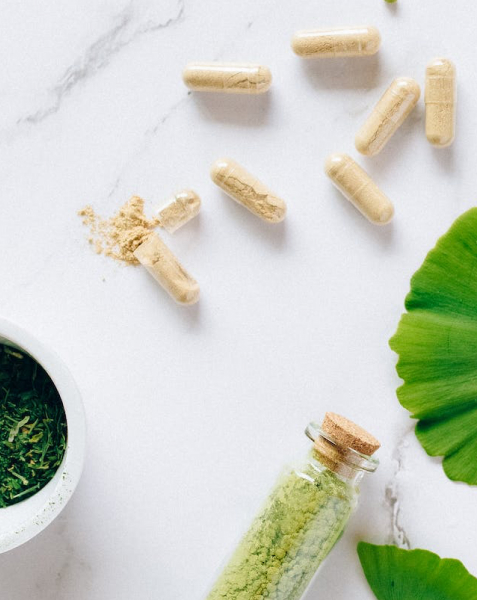Nothing replaces a healthy diet, and if you’re eating enough and getting a balanced plant-based diet, then you should be able to get almost everything you need from your food. However, we do need to acknowledge that it isn’t always easy to eat perfectly, especially when really busy, cooking for a family, travelling, have certain allergies and so on.
Key nutrients
B12
B12 is found solely in animal products and is required for DNA synthesis, detoxification, fertility, hormone balance, brain function and the nervous system. The impacts of B12 deficiency are far-reaching, so getting your levels checked every year is a must if you have eaten plant-based for more than 6 months and plan to continue to do so, or if you are pregnant or breastfeeding.
If you do need to supplement, then it’s advisable to consult your doctor or a nutritionist about what dose you might need. Choosing an absorbable form such as methyl-cobalamin or adenosylcobalamin is a good idea. The brand Cytoplan and Wild Nutrition have good options, or you can choose a multivitamin such as those from Equi London or TerraNova. You can also buy liquid B12 and add a drop into a smoothie or water each day.
Vitamin D
Though some foods such as mushrooms contain vitamin D, it is not possible to get enoughfrom diet alone. Most of our vitamin D is made in the body when our skin is exposed to sun’s rays. The amount of sunlight needed to make enough vitamin D depends greatly on factors such as skin colour and the strength of the sun. Vitamin D deficiency is more common for those of us living in the northern or southern hemisphere, working in an office, covering up from the sun or wearing SPF, especially if they have darker skin tones.
The UK government recommend everyone should take 10mcg (400iu) of vitamin D3 daily through the winter (October – April) but many experts advise taking this throughout the year. Many brands sell vitamin D and there are also options available that include vitamin K2 either as part of a multivitamin or an oral spray.
Omega 3
Many people find they benefit from taking an additional vegan omega 3 supplement on top of eating their plant-based omega 3 sources. These are usually algae-based and 500mg-1000mg per day is a good daily dose – ensure your product provides both DHA and EPA omega-3 such as Viridian, Biocare or Dr.Vegan.
Vitamin A
There is plenty of beta-carotene (the inactive form of vitamin A) in a plant-based diet, but active vitamin A is only found in animal sources of food. Beta carotene does convert to vitamin A naturally in the body, but this can be slow in some people, so supplementing a modest amount can be a good idea for some people. Vitamin A is usually found in well-formulated multivitamins for vegans, such as Dr.Vegan.
(NB. the NHS does not recommend supplementing Vitamin A when pregnant.)
Iron
Though there are many iron-rich, plant-based foods, it is a good idea to get your levels checked each year, especially if you have heavy periods, suffer with fatigue, poor thyroid function, are pregnant or have recently given birth. It’s a good idea to ask for your ferritin to be checked as well as your iron, as this represents the amount of iron stored in the body. If this is below 50ng/mL then it’s worth working to increase your iron intake, even if your blood reading for is normal.
Traditional iron supplements are known for giving some people uncomfortable side effects in the gut. These can include stomach cramps and constipation, but newer, better forms of supplementary iron are far easier on the stomach and much better absorbed. The nutrient reference value for supplements is 14mg and look for ferrous bisglycinate or ferrous gluconate which can be taken on its own or in a multivitamin, such as Equi London.
Choline
Emerging evidence is suggesting that choline is a more common deficiency, and women who are pregnant or breastfeeding are at higher risk because demand increases during this time. The European Food Safety Authority recommend 400mg of choline per day (480mg-510mg when pregnant/breastfeeding) which can be tricky on a plant-based diet unless you give it proper attention.
Most multivitamins do not add in Choline but you can find good quality products such as Equi London’s Original Formula or Pregnancy Formula. Body Bio are good for higher strength capsules.














